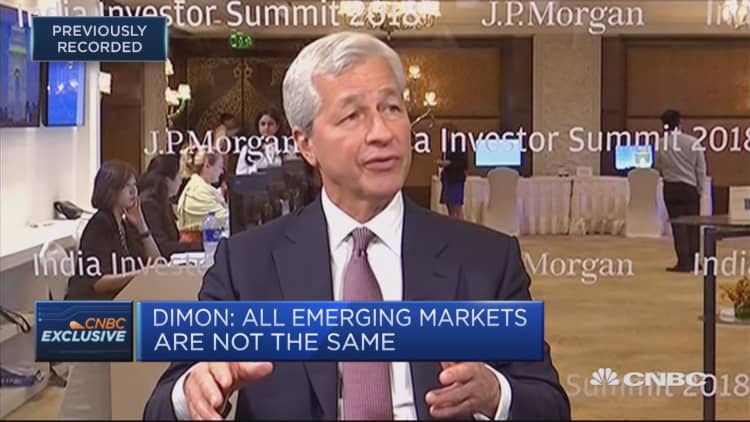
The dispute over trade and escalating tariffs between the U.S. and China are a "trade skirmish" rather than a trade war, Jamie Dimon, chairman and chief executive officer of J.P. Morgan Chase, told CNBC-TV18 on Thursday.
"It's not a trade war, I call it a trade skirmish," he told CNBC-TV18's Shereen Bhan in New Delhi.
"The American government, our president, is right to raise the issues (about fair trade practices) with China," he said, although he added that he "may have used a different strategy to go about fixing it."
"It's unclear where we're going to get to," he added.
Dimon's comments came after U.S. President Donald Trump decided to implement further tariffs on Chinese goods. On Monday, he announced a 10 percent tariff on $200 billion worth of Chinese imports. Those duties will rise to 25 percent at the end of the year.
In response, China announced tariffs targeting more than 5,000 U.S. products — worth about $60 billion — that will go into effect on September 24. The country has also filed a complaint to the World Trade Organization (WTO) against the U.S.
Dimon said the tariffs would not have that many ramifications for the American consumer or economy.
"But if you look at tariffs on $200 billion (worth of Chinese goods), and this may all get passed on to American consumers and they have to pay another $20 billion (on Chinese imports), it's a $20 trillion economy, so the actual economic effect is not dramatic," Dimon said.
"We can add tariffs to more things and the Chinese can retaliate in other ways and I don't think all that's good. It's not a devastating thing, it's not a war, it's a trade skirmish that can have negative economic effects."
Trump appeared to leave the door open for negotiations with China, telling reporters during a visit with Poland's president on Tuesday that the U.S. may make a deal with China at some point and that his country is always open to talking. Dimon said he didn't expect any immediate resolution, however.
"There is an effect on the psyche, the mind, if the trade skirmish becomes a trade war but right now it's just trade tit-for-tat and hopefully we'll get to a resolution. I don't expect a trade war but I also don't expect any progress before (U.S. Mid-Term) elections."
Dimon's only worry about the trade tensions was whether it could "offset some of the positive effects" that he said had been seen from President Trump's "regulatory reform and tax reform and other pro-business policies."
President Dimon?
Dimon's complimentary comments on Trump's policies come after he appeared to take a swipe at the president's leadership abilities last week, saying he could defeat Trump in an election.
"I think I could beat Trump," Dimon said last Wednesday during an event held at his bank's Park Avenue headquarters in New York. "Because I'm as tough as he is, I'm smarter than he is. I would be fine. He could punch me all he wants, it wouldn't work with me. I'd fight right back."
He retracted the comments after they caused a furore, saying shortly afterwards, "I should not have said it. I'm not running for president."
Dimon told CNBC's TV-18 on Thursday that the U.S. is "an unbelievable, prosperous economy" but said "but as policy we need to look at the things we're not doing well" listing some issues he feels are not being addressed.
"Inter-city school education, taking care of the opioid crisis, infrastructure takes us too long to build, there is still too much bureaucracy and regulation inhibiting small business growth," he said.
"So there's a long series of things that America should also focus and have good policy (on) and most of that policy is not Democratic or Republican, it's good policy. Unfortunately, a lot of the partisan stuff stops good policy getting done and i think it's part of the reason that America is growing slower."


